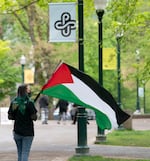A small group of protesters set up tents and barricades in Portland’s South Park Blocks on Thursday in support of Palestinians in Gaza and in protest of Portland State University’s ties with companies that have contracts with Israel. Similar protests have roiled universities across the country in recent weeks.

A protester carries a flag in Portland State Univeristy’s South Park Blocks, April 26, 2024. Protesters in support of Palestinians in Gaza and in protest of Portland State University’s ties with companies that have contracts with Israel, set up tents and barricades on Thursday and were removed by police after several hours. Police warned in a statement Friday morning that anybody occupying a closed park, engaging in violent activity, or destroying property could be arrested.
Kristyna Wentz-Graff / OPB
Portland State University president Ann Cudd joined “All Things Considered” host Crystal Ligori to discuss the protests and the line between free speech and harassment. An edited version of their conversation is below.
Crystal Ligori: What have you been hearing from students in terms of demands or plans to protest? And has there been an open dialogue?
Ann Cudd: So there hasn’t been much of an open dialogue to this point and that’s really why I sent out the communication that I sent out today. We have had protests, for the most part, on what I would call the pro-Palestinian side. And they have been essentially shouting slogans and demands, and the main demand that I have heard is that we not invest in Boeing. We don’t actually invest in Boeing, so I have responded in the past to the students and clarified that in fact, we receive contributions for scholarship programs from Boeing. So there hasn’t been really much dialogue from the side of the protesters about why they are opposed to that.
Ligori: Do you have an estimate of how much money and donations or scholarships PSU has gotten from Boeing?
Cudd: Over the years we’ve received about a million dollars. Now, this is over the course of probably a couple of decades.
Ligori: What are you hearing from Jewish students on campus about how safe they feel?
Cudd: We have heard some from Jewish students but more from Jewish organizations, I would say. Especially from PDX Hillel. They are concerned that the protests can be intimidating. They are concerned about the content of the messages, as well as the kind of conduct that goes along with the way that the messages are expressed.
Ligori: I know some other universities have shifted to remote classes. Is PSU doing anything similar to protect students during this tumultuous time?
Cudd: Well, at this point, I would not say that we’ve reached such tumult that we have to go remote. However, we are trying to draw a really bright line between protected speech and protest on the one hand, and on the other hand discrimination, harassment, intimidation or property damage or assault on the other — which goes beyond what we would allow.
Ligori: Portland, the city at large, has a long history of protests. Are you concerned at all that people who are not students might be coming to these encampments or protests?
Cudd: Yeah, we know that many of the people involved in these protests are not students. They are community members who say they’re allies with the students. And the problem is that while we can hold our own students, faculty, and staff to our standards of conduct, we cannot do the same for community members.
Ligori: In an interview with PSU student media last month, you said the school is in favor of free speech and protests. Are there any additional actions that PSU has put in place for students and faculty to feel safe to voice their opinions?
Cudd: I have in various forums such as the faculty senate meetings, expressed my commitment to academic freedom and the right to protest and free speech. I’ve tried to repeat that a number of times and I think our actions indicate that we are supporting that. Our student leadership group also helps to inform students about what constitutes peaceful protest and reasonable kinds of actions and what goes beyond that. So we are taking proactive measures to make sure that our students understand what are the limits, what kind of actions constitute harassment or intimidation that would be not protected speech, but on the other hand, help them to understand how best to conduct protests or to express themselves.
Ligori: I imagine that you’ve been watching fellow university presidents testify before Congress in recent months. What would you say if you were questioned by congressional members about the rights of free speech on campus?
Cudd: Well, I would give a full-throated defense of free speech and academic freedom. We’re a university, we’re committed to supporting our students and our faculty in engaging in free inquiry and debate and also expressing their views loudly in some cases, especially on such a fraught and difficult topic as the war in Gaza. We understand that our students have strong opinions and strong feelings on this, not just our students, but our entire campus. We want to support people’s expression, but we can’t allow the expression of some to completely intimidate and harass others and so that’s where we draw the line.